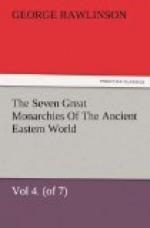A few touches of a darker hue must be added to this portrait of the great Babylonian king from the statements of another contemporary, the prophet Jeremiah. The execution of Jehoi-akim, and the putting out of Zedekiah’s eyes, though acts of considerable severity, may perhaps be regarded as justified by the general practice of the age, and therefore as not indicating in Nebuchadnezzar any special ferocity of disposition. But the ill-treatment of Jehoiakim’s dead body, the barbarity of murdering Zedekiah’s sons before his eyes, and the prolonged imprisonment both of Zedekiah and of Jehoiachin, though the latter had only contemplated rebellion, cannot be thus excused. They were unusual and unnecessary acts, which tell against the monarch who authorized them, and must be considered to imply a real cruelty of disposition, such as is observable in Sargon and Asshur-bani-pal. Nebuchadnezzar, it is plain, was not content with such a measure of severity as was needed to secure his own interests, but took a pleasure in the wanton infliction of suffering on those who had provoked his resentment.
On the other hand, we obtain from the native writer, Berosus, one amiable trait which deserves a cursory mention. Nebuchadnezzar was fondly attached to the Median princess who had been chosen for him as a wife by his father from political motives. Not content with ordinary tokens of affection, he erected, solely for her gratification, the remarkable structure which the Greeks called the “Hanging Garden.” A native of a mountainous country, Amyitis disliked the tiresome uniformity of the level alluvium, and pined for the woods and hills of Media. It was to satisfy this longing by the best substitute which circumstances allowed that the celebrated Garden was made. Art strove to emulate nature with a certain measure of success, and the lofty rocks and various trees of this wonderful Paradise, if they were not a very close imitation of Median mountain scenery, were at any rate a pleasant change from the natural monotony of the Babylonian plain, and must have formed a grateful retreat for the Babylonian queen, whom they reminded at once of her husband’s love and of the beauty of her native country.




